Husband-and-wife songwriting team Alan and Marilyn Bergman have been nominated for an incredible 16 Academy Awards, winning twice for Best Song (“The Windmills of Your Mind” and “The Way We Were”) and once for Best Original Score (“Yentl”).
Other notable songs that they co-wrote include more for the big screen (“In the Heat of the Night”, “How Do you Keep the Music Playing”, and “What Are You Doing the Rest of Your Life?”), some for the small screen (the theme songs to the TV shows “Good Times” and “Maude”), and other musical gems (“You Don’t Bring Me Flowers”, “Nice ‘n’ Easy”).
This interview was for a preview article for Alan’s 5/17/14 performance at the Lobero Theatre in Santa Barbara.
Jeff Moehlis: What can we look forward to at the show?
Alan Bergman: I’m going to be singing songs that Marilyn and I wrote with the wonderful composers that we’ve collaborated with. There’ll be a little spot for Tierney Sutton to sing a couple of songs, and we’ll do a duet together. She’s a wonderful singer and an old friend. She said, “Can I come?” and I said, “Absolutely.”
JM: There are many amazing things about your work, and one that’s particularly intriguing to me is that you’ve had such a long-running, productive songwriting partnership with your wife. Do you have a secret for working together?
AB: [laughs] People ask about that because we’re together 24 hours a day. We write together, live together, love together, and have since 1956, so it’s a long collaboration. You know, when you do something you love, with somebody you love, life is really a paradise. This may sound glib, but the secret is one washes and one dries. After saying that for a while, we wrote a song called that [“One Washes, One Dries”]. You know, it’s like any good collaboration, any good marriage. There’s trust, respect, and the loving of doing it. That’s what we do.
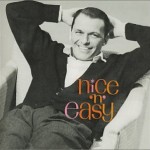
JM: One of your early compositions was “Nice ‘n’ Easy”, which was recorded by Frank Sinatra. Was that written with him in mind?
AB: Oh, absolutely. His manager put out a call to a lot of songwriters to write a song. He was making an album of lightly swinging love songs, and they needed a title song. And I’m sure there were many, many submissions, and luckily he chose ours, and made a wonderful record. That was 1960. We were in the studio and we were very young, and he called us “the kids”. Ever since then he called us “the kids”.
JM: Was it kind of intimidating to be in the studio watching him record this?
AB: Oh, God yes [laughs].
JM: He did a great job with it.
AB: Did he ever!
JM: Many of your best known songs were written for movies. The ones that jump out to me are “The Windmills of Your Mind”, “In the Heat of the Night”, and “The Way We Were”. How much guidance did you typically receive from the directors of the movies on what they wanted?
AB: Quite a bit. They would show us the footage that they wanted the song for, and luckily those directors that you’re talking about really knew the value of the song, how to use it, what the function could be. Not a title song, but something that was truly an extension of the screenplay.
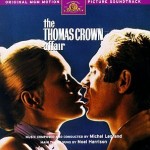
As far as “Windmills” is concerned, Norman Jewison, the director, said that when the McQueen character was flying this glider, he had just masterminded the robbery of the bank and he was very tense, and Norman said, “I want you to write me a song that underlines the anxiety the character was going through at that moment.” Flying a glider was obviously a wonderful way to relax, but you could see that there was no relaxation in the scene. So that’s what we did, that’s how “Windmills” came about, with a wonderful melody by Michel Legrand. And we do write to the melodies. When he wrote melody, we didn’t change a dot on a note. A very baroque melody, circular in motion just like the flying of the glider, the look of the glider, making circles. Each image in that song is a circular image, round like a circle.
JM: Of course I have to ask you about working with Barbra Streisand.
AB: Well, that’s a thrill. You’re talking about somebody who’s truly the greatest voice we have. She’s wonderful to write for because she really communicates the lyric, tells the story masterfully. To be a great singer you have to have it in three places: the mind/the intelligence, the heart, and in your pipes. But she’s got in four places, really, because she’s a wonderful director, besides being a terrific actor. All that is in her interpretation, and for a lyric writer, a songwriter, that’s the best you can get.
JM: Do you remember when you heard her sing one of your songs for the first time, what that experience was like?
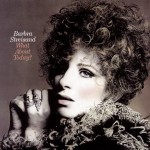
AB: Oh, yes. There was a song she sang for an album years ago [What About Today?] – I say album, it was an album in those days – with new songwriters. She had done two or three LPs with standards, and she wanted to do something with young writers. One of those songs was ours, “Ask Yourself Why”. That was a terrific thrill.
And she did it in her act in Las Vegas, and that was even more of a thrill.
JM: One more question about Barbra. Can you tell me a bit about the process of putting together the music for Yentl?
AB: That was a wonderful project. We worked with her a couple of years, and read all the scripts. There were many, many scripts. With Michel Legrand, who in addition to being a composer is a dramatist, too, as for many of the composers that we worked with. We would finish a song and she would come and sing it for us, and see if we needed to fix anything. It’s a great voice to work with, not only the interpretive qualities but the instrument, it’s a marvelous instrument. It’s limitless what you can write for.

And she did a fantastic job as a director. I don’t know if you’ve seen it, but there’s a wonderful DVD out of the movie, and then there’s a second DVD of the rehearsal process. A lot of it was shot in our living room here, with a little TV camera. You can see in some of sequences in this second DVD, it goes from that little television camera to the actual film, and you can see the process. It’s just wonderful.
JM: When I was prepping for this interview, I was reminded that Mandy Patinkin is in Yentl. My generation knows him from Homeland. Do you watch Homeland at all?
AB: Oh yeah! Absolutely. But people ask how come he didn’t sing in that [Yentl]. That was a technique of the movie, the songs that she sang were inner dialog. She had nobody to talk to. That would’ve strained that technique, had somebody else sung.
JM: And of course Mandy doesn’t sing in Homeland either [both laugh].
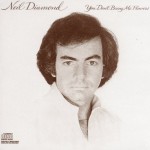
What inspired the lyric to “You Don’t Bring Me Flowers”?
AB: Well, that’s an interesting story. Norman Lear, for whom we wrote some theme songs – Maude, Good Times, and things like that – he called us one day, and he said would we write a theme for a new show he was doing with Neil Diamond. And we said, “Sure, why not?” So he sent over a script and we wrote a song, we wrote “You Don’t Bring Me Flowers”.
Now, when you did theme songs for television shows in those days, they were 45 seconds long, so it’s not really a song, it’s half a song. And when he sent over the pilot that they had shot, “You Don’t Bring Me Flowers” had nothing to do with the pilot. It just didn’t work. They had changed and rewritten so much that it didn’t work. The show became a show about women’s domination over men. So Norman said, “What are we going to do?” And we said, “Well, we’ll write you another song.” Neil was on the road and he couldn’t do it, he was in Kansas City or somewhere, I don’t know. So Marilyn and I wrote a talking blues for that show called “Genesis Revisited”. Kenny Rankin sang it on the television show, which was on not as long as the story I’m telling you.
Then Neil called from the road and said, “Everybody loves this song, I’m going to record it.” And we said, “You’d better come back and let us finish the song, because it’s only half a song.” Which he did. We finished the song and he recorded it. Barbra heard it and she recorded it separately. And then there was a disc jockey in Kentucky who was having a lot of trouble with his wife. He put the two records together, and luckily they were in the same key. That version wasn’t over before people started calling, “Where can I buy this record?” It was an instant hit in Kentucky. So Columbia heard about this, and they went in and recorded it together, and made a wonderful record of it.
What year I don’t remember [1980], they did it on the Grammys show. Barbra directed that, it was great.
JM: What advice would you give to an aspiring songwriter or musician?
AB: Two things. One, to read two books of Sondheim’s [Finishing the Hat; Look, I Made a Hat]. They’re fantastic books on writing, especially writing for the theater. They’re wonderful books.
And then I suggest that young songwriters listen to the great writers. Listen to Cole Porter, and Rodgers and Hammerstein, and Johnny Mercer, and Yip Harburg, and Lerner and Loewe, and Rodgers and Hart. I mean, those people, you can go to school on them. Learn why Irving Berlin’s songs are still sung, why they appeal to people no matter what generation you are. Because they appeal to both the mind and the heart. What we lack today in a lot of the songs are melodies. There’s great melodies there. Marilyn and I were very lucky because we were brought up in that golden age of the Great American Songbook and Broadway. We learned from them, and luckily I had Johnny Mercer as a mentor for two or three years, and Marilyn had a wonderful lyric writer by the name of Bob Russell. So that’s how you learn.
Richard Brooks – a director, a writer for whom we wrote “What Are You Doing the Rest of Your Life” – told us a wonderful story. When he was a kid he ran away from home and went on the rails. He was in a typical hobo camp, and one night they were drinking soup around the fire, and a hobo came up to him and said, “What do you do, kid?” And Richard said, “I’m a writer.” He said, “Oh, you’re a writer, huh? Have you read Dostoyevsky, have you read Tolstoy?” Richard said, “Yes, I’ve read them.” And he said, “Let me give you some advice kid. If you want to be a writer, for every word you write you should read a thousand.” And I tell that to young songwriters. I say, for every song you write listen to hundreds of great songs in the Great American Songbook, and you’ll learn.
JM: Where are you speaking to me from?
AB: I’m in the room where we work in our home. Yes, we have a long walk from the kitchen or the bedroom to our humble studio here. We have a charmed life.

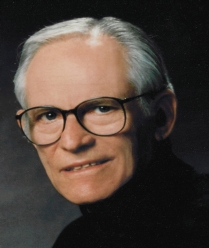
Discussion
No comments for “Interview: Alan Bergman”